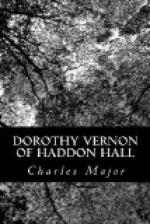“Perhaps he has not,” said Dorothy, musingly.
It was not a pleasant task for me to praise Sir John, but my sense of justice impelled me to do so. I tried to make myself feel injured and chagrined because of Dorothy’s manner toward him; for you must remember I had arranged with myself to marry this girl, but I could not work my feelings into a state of indignation against the heir to Rutland. The truth is, my hope of winning Dorothy had evaporated upon the first sight of her, like the volatile essence it really was. I cannot tell you why, but I at once seemed to realize that all the thought and labor which I had devoted to the arduous task of arranging with myself this marriage was labor lost. So I frankly told her my kindly feelings for Sir John, and gave her my high estimate of his character.
I continued: “You see, Dorothy, I could not so easily explain to your father my association with Sir John, and I hope you will not speak of it to any one, lest the news should reach Sir George’s ears.”
“I will not speak of it,” she returned, sighing faintly. “After all, it is not his fault that his father is such a villain. He doesn’t look like his father, does he?”
“I cannot say. I never saw Lord Rutland,” I replied.
“He is the most villanous-looking—” but she broke off the sentence and stood for a moment in revery. We were in the darkened passage, and Dorothy had taken my hand. That little act in another woman of course would have led to a demonstration on my part, but in this girl it seemed so entirely natural and candid that it was a complete bar to undue familiarity. In truth, I had no such tendency, for the childish act spoke of an innocence and faith that were very sweet to me who all my life had lived among men and women who laughed at those simple virtues. The simple conditions of life are all that are worth striving for. They come to us fresh from Nature and from Nature’s God. The complex are but concoctions of man after recipes in the devil’s alchemy. So much gold, so much ambition, so much lust. Mix well. Product: so much vexation.
“He must resemble his mother,” said Dorothy, after a long pause. “Poor fellow! His mother is dead. He is like me in that respect. I wonder if his father’s villanies trouble him?”
“I think they must trouble him. He seems to be sad,” said I, intending to be ironical.
My reply was taken seriously.
“I am sorry for him,” she said, “it is not right to hate even our enemies. The Book tells us that.”
“Yet you hate Lord Rutland,” said I, amused and provoked.
Unexpected and dangerous symptoms were rapidly developing in the perverse girl, and trouble was brewing “in Derbyshire.”
The adjective perverse, by the way, usually is superfluous when used to modify the noun girl.
“Yet you hate Lord Rutland,” I repeated.
“Why, y-e-s,” she responded. “I cannot help that, but you know it would be very wrong to—to hate all his family. To hate him is bad enough.”




